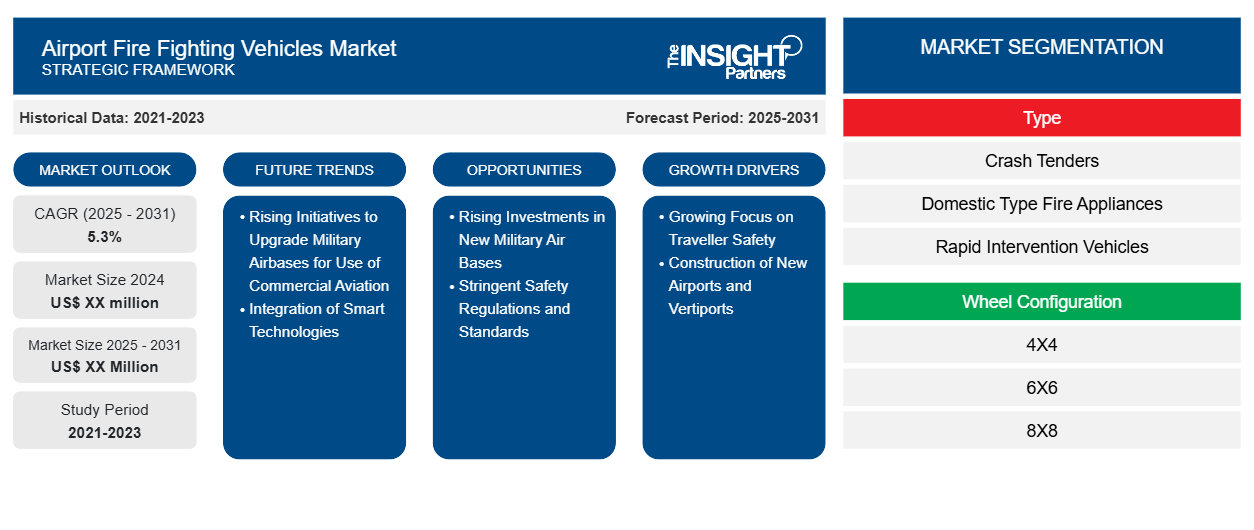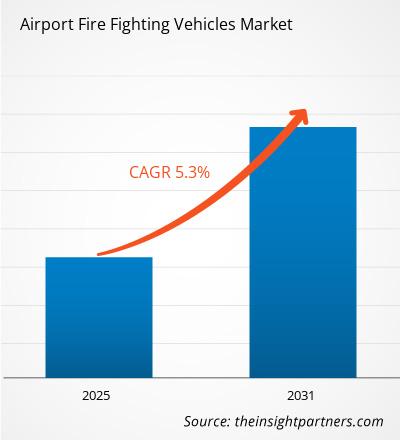Airport Fire Fighting Vehicles Market Overview and Growth 2031 by Leading Top Players
Airport Fire Fighting Vehicles Market Size and Forecasts (2021 - 2031), Global and Regional Share, Trends, and Growth Opportunity Analysis Report Coverage: By Type (Crash Tenders, Domestic Type Fire Appliances, Rapid Intervention Vehicles, General Purpose Vehicles); Wheel Configuration (4X4, 6X6, 8X8); Application (Commercial Airports, Military Air Bases) , and Geography (North America, Europe, Asia Pacific, and South and Central America)
Historic Data: 2021-2023 | Base Year: 2024 | Forecast Period: 2025-2031- Report Date : Apr 2026
- Report Code : TIPRE00025480
- Category : Aerospace and Defense
- Status : Upcoming
- Available Report Formats :


- No. of Pages : 150
The Airport Fire Fighting Vehicles Market is expected to register a CAGR of 5.3% from 2025 to 2031, with a market size expanding from US$ XX million in 2024 to US$ XX Million by 2031.
The report is segmented by Type (Crash Tenders, Domestic Type Fire Appliances, Rapid Intervention Vehicles, General Purpose Vehicles); Wheel Configuration (4X4, 6X6, 8X8); Application (Commercial Airports, Military Air Bases). The global analysis is further broken-down at regional level and major countries. The Report Offers the Value in USD for the above analysis and segments.
Purpose of the Report
The report Airport Fire Fighting Vehicles Market by The Insight Partners aims to describe the present landscape and future growth, top driving factors, challenges, and opportunities. This will provide insights to various business stakeholders, such as:
- Technology Providers/Manufacturers: To understand the evolving market dynamics and know the potential growth opportunities, enabling them to make informed strategic decisions.
- Investors: To conduct a comprehensive trend analysis regarding the market growth rate, market financial projections, and opportunities that exist across the value chain.
- Regulatory bodies: To regulate policies and police activities in the market with the aim of minimizing abuse, preserving investor trust and confidence, and upholding the integrity and stability of the market.
Airport Fire Fighting Vehicles Market Segmentation
Type
- Crash Tenders
- Domestic Type Fire Appliances
- Rapid Intervention Vehicles
- General Purpose Vehicles
Wheel Configuration
- 4X4
- 6X6
- 8X8
Application
- Commercial Airports
- Military Air Bases
Geography
- North America
- Europe
- Asia-Pacific
- South and Central America
- Middle East and Africa
Customize This Report To Suit Your Requirement
Get FREE CUSTOMIZATIONAirport Fire Fighting Vehicles Market: Strategic Insights

-
Get Top Key Market Trends of this report.This FREE sample will include data analysis, ranging from market trends to estimates and forecasts.
Airport Fire Fighting Vehicles Market Growth Drivers
- Growing Focus on Traveller Safety: The growing government focus on airport security and safety services, which is anticipated to drive the demand for airport fire fighting vehicles market across the globe. The growing focus on passenger and worker safety in airport premises is anticipated to drive the growth of the market.
- Construction of New Airports and Vertiports : Vertiports are centers for vertical takeoff and landing vehicles such as eVTOL vehicles, drones, and air taxis. The increasing demand for competent urban transportation and developments in eVTOL technology, and the shortage of available land to build conventional vertiports fuel the need for advanced vertiports. In 2022, VPorts declared to establish a network of vertiports in Quebec and to form corridors between Quebec and the US specifically for eVTOL aircraft. In 2023, Ferrovial Airports collaborated with Eve Air Mobility to develop vertiports for eVTOL aircraft. The growing demand for sustainable and low-carbon emission approaches in the aviation and logistics sectors boosts the demand for new airports for eVTOL aircraft. The advancement of vertiports can transform urban strategies for efficient and eco-friendly city transport or logistic modes. Thus, the growing construction of new vertiports is expected to create new opportunities for the airport fire fighting vehicles market growth in the coming years.
Airport Fire Fighting Vehicles Market Future Trends
- Rising Initiatives to Upgrade Military Airbases for Use of Commercial Aviation: Governments of several countries have been taking initiatives to allow their respective military airports for commercial aircraft landings and operations to provide better convenience for managing rising passenger traffic across different regions until new commercial airports are operational. Thus, rising initiatives to upgrade military airbases for the use of commercial aviation are anticipated to fuel the growth of the airport fire fighting vehicles market during the forecast period.
- Integration of Smart Technologies: The airport firefighting vehicles market is adopting advanced technologies like AI, IoT, and autonomous driving. These innovations enhance vehicle response times, improve situational awareness, and ensure precise firefighting operations. The integration of smart systems will increase efficiency and safety, positioning these vehicles as indispensable in modernizing airport emergency services.
Airport Fire Fighting Vehicles Market Opportunities
- Rising Investments in New Military Air Bases: The evolving modern warfare scenario has compelled governments of various countries across the globe to assign significant funds and financial aid toward respective defense and military forces. The defense budget allocation supports army and military forces to purchase enhanced technologies and equipment from domestic or international developers. Thus, the rising investment in new military base development drives the airport fire fighting vehicles market.
- Stringent Safety Regulations and Standards: As aviation safety standards become stricter, airports must upgrade their firefighting equipment to comply with evolving regulations. This creates a growing market for innovative, high-performance airport fire trucks that meet international safety protocols, offering a significant growth opportunity for companies specializing in compliant, next-gen firefighting vehicles.
Airport Fire Fighting Vehicles Market Regional Insights
The regional trends and factors influencing the Airport Fire Fighting Vehicles Market throughout the forecast period have been thoroughly explained by the analysts at The Insight Partners. This section also discusses Airport Fire Fighting Vehicles Market segments and geography across North America, Europe, Asia Pacific, Middle East and Africa, and South and Central America.
Airport Fire Fighting Vehicles Market Report Scope
| Report Attribute | Details |
|---|---|
| Market size in 2024 | US$ XX million |
| Market Size by 2031 | US$ XX Million |
| Global CAGR (2025 - 2031) | 5.3% |
| Historical Data | 2021-2023 |
| Forecast period | 2025-2031 |
| Segments Covered |
By Type
|
| Regions and Countries Covered |
North America
|
| Market leaders and key company profiles |
|
Airport Fire Fighting Vehicles Market Players Density: Understanding Its Impact on Business Dynamics
The Airport Fire Fighting Vehicles Market is growing rapidly, driven by increasing end-user demand due to factors such as evolving consumer preferences, technological advancements, and greater awareness of the product's benefits. As demand rises, businesses are expanding their offerings, innovating to meet consumer needs, and capitalizing on emerging trends, which further fuels market growth.

- Get the Airport Fire Fighting Vehicles Market top key players overview
Key Selling Points
- Comprehensive Coverage: The report comprehensively covers the analysis of products, services, types, and end users of the Airport Fire Fighting Vehicles Market, providing a holistic landscape.
- Expert Analysis: The report is compiled based on the in-depth understanding of industry experts and analysts.
- Up-to-date Information: The report assures business relevance due to its coverage of recent information and data trends.
- Customization Options: This report can be customized to cater to specific client requirements and suit the business strategies aptly.
The research report on the Airport Fire Fighting Vehicles Market can, therefore, help spearhead the trail of decoding and understanding the industry scenario and growth prospects. Although there can be a few valid concerns, the overall benefits of this report tend to outweigh the disadvantages.
Frequently Asked Questions
Naveen is an experienced market research and consulting professional with over 9 years of expertise across custom, syndicated, and consulting projects. Currently serving as Associate Vice President, he has successfully managed stakeholders across the project value chain and has authored over 100 research reports and 30+ consulting assignments. His work spans across industrial and government projects, contributing significantly to client success and data-driven decision-making.
Naveen holds an Engineering degree in Electronics & Communication from VTU, Karnataka, and an MBA in Marketing & Operations from Manipal University. He has been an active IEEE member for 9 years, participating in conferences, technical symposiums, and volunteering at both section and regional levels. Prior to his current role, he worked as an Associate Strategic Consultant at IndustryARC and as an Industrial Server Consultant at Hewlett Packard (HP Global).
- Historical Analysis (2 Years), Base Year, Forecast (7 Years) with CAGR
- PEST and SWOT Analysis
- Market Size Value / Volume - Global, Regional, Country
- Industry and Competitive Landscape
- Excel Dataset
Recent Reports
Related Reports
Testimonials
The Insight Partners' SCADA System Market report is comprehensive, with valuable insights on current trends and future forecasts. The team was highly professional, responsive, and supportive throughout. We are very satisfied and highly recommend their services.
RAN KEDEM Partner, Reali Technologies LTDsI requested a report on a very specific software market and the team produced the report in a few days. The information was very relevant and well presented. I then requested some changes and additions to the report. The team was again very responsive and I got the final report in less than a week.
JEAN-HERVE JENN Chairman, Future AnalyticaWe worked with The Insight Partners for an important market study and forecast. They gave us clear insights into opportunities and risks, which helped shape our plans. Their research was easy to use and based on solid data. It helped us make smart, confident decisions. We highly recommend them.
PIYUSH NAGPAL Sr. Vice President, High Beam GlobalThe Insight Partners delivered insightful, well-structured market research with strong domain expertise. Their team was professional and responsive throughout. The user-friendly website made accessing industry reports seamless. We highly recommend them for reliable, high-quality research services
YUKIHIKO ADACHI CEO, Deep Blue, LLC.This is the first time I have purchased a market report from The Insight Partners.While I was unsure at first, I visited their web site and felt more comfortable to take the risk and purchase a market report.I am completely satisfied with the quality of the report and customer service. I had several questions and comments with the initial report, but after a couple of dialogs over email with their analyst I believe I have a report that I can use as input to our strategic planning process.Thank you so much for taking the extra time and making this a positive experience.I will definitely recommend your service to others and you will be my first call when we need further market data.
JOHN SUZUKI President and Chief Executive Officer, Board Director, BK TechnologiesI wish to appreciate your support and the professionalism you displayed in the course of attending to my request for information regarding to infectious disease IVD market in Nigeria. I appreciate your patience, your guidance, and the fact that you were willing to offer a discount, which eventually made it possible for us to close a deal. I look forward to engaging The Insight Partners in the future, all thanks to the impression you have created in me as a result of this first encounter.
DR CHIJIOKE ONYIA MANAGING DIRECTOR, PineCrest Healthcare Ltd.Reason to Buy
- Informed Decision-Making
- Understanding Market Dynamics
- Competitive Analysis
- Identifying Emerging Markets
- Customer Insights
- Market Forecasts
- Risk Mitigation
- Boosting Operational Efficiency
- Strategic Planning
- Investment Justification
- Tracking Industry Innovations
- Aligning with Regulatory Trends




















 Get Free Sample For
Get Free Sample For